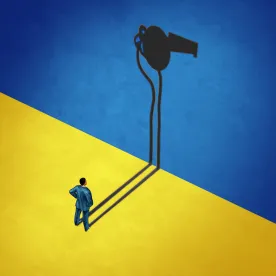On September 23, 2020, by a vote of 3 to 2, the U.S. Securities and Exchange Commission announced the adoption of a final rule implementing several changes to its whistleblower program, citing the need to “provide greater clarity to whistleblowers and increase the program’s efficiency and transparency.” The following addresses the key provisions of the final rule.
The Commission Clarifies Its Award-Setting Procedures
One of the most notable provisions of the final rule changed how the Commission sets award amounts. Under the terms of the Dodd-Frank Act which established the whistleblower program, awards must equal between 10 percent and 30 percent of the total monetary sanctions recovered as a result of the information provided by the whistleblower, as determined by the award criteria outlined in 17 C.F.R. § 240.21F-6.
Presumption of the Statutory Maximum for Awards Less than $5 Million
For awards where the statutory maximum of 30 percent is $5 million or less, the final rule adopted a presumption that the whistleblower will receive the maximum award, so long as none of the negative award-reducing criteria in Rule 21F-6(b) are present. The Commission noted that approximately 75% of all awards have been for $5 million or less, and thus, this presumption should provide increased transparency and streamline the award determination process.
Continued Discretion in Setting Awards More Than $5 Million
For awards expected to exceed $5 million, the Commission’s original proposal in July 2018 included a separate review process allowing it to make additional downward adjustments to “exceedingly large awards” of at least $30 million to an individual whistleblower. The final rule removed this process, but the Commission noted that it already possessed broad discretion to adjust award amounts under the existing award criteria in Rule 21F-6. The Commission further clarified that while it would evaluate only the statutory award criteria in setting award amounts, consistent with its long-standing practices, this evaluation would consider not just the percentage of monetary sanctions captured by the award but also the total dollar amount of the award. One rationale provided by the Commission was that “actual dollar figures—not abstract percentages—are most likely to advance the whistleblower award program’s goal of incentivizing potential whistleblowers.”
However, the Commission noted that based upon historical application of the award criteria, if none of the negative award-reducing criteria specified in Rule 21F-6(b) are present, the award amount should be in the top third of the award range.
Allowing Awards for Additional Forms of Dispute Resolution
To qualify for an award, information provided by a whistleblower must lead to the collection of monetary sanctions through either: 1) a judicial or administrative enforcement action by the Commission; or 2) a related action brought by the U.S. Attorney General, another regulatory authority, a self-regulatory organization, or a state attorney general in a criminal case. The final rule added additional types of Commission enforcement actions that will now be eligible for a whistleblower award: 1) deferred prosecution agreements; 2) non-prosecution agreements; and 3) settlement agreements outside the context of a judicial or administrative proceeding. The amount of the awards stemming from these alternative resolutions will still consist of a percentage of the money recovered, as determined by the standard award-setting process.
Prohibiting Multiple Recoveries under Other Whistleblower Programs
The final rule introduced a provision clarifying that an action by a separate regulatory authority does not qualify as a related action under the Commission’s whistleblower program if the Commission determines that there is a different award program (such as the CFTC whistleblower program) that more appropriately applies to the separate regulatory action. Furthermore, this “multiple-recovery” rule also precludes whistleblowers who have been denied awards by other whistleblower programs from re-adjudicating issues before the Commission that were already resolved against them by the other program and requires whistleblowers to waive their claims to awards under other programs prior to accepting an award from the Commission.
Clarifying the “Independent Analysis” Requirement
Section 21F of the Exchange Act limits whistleblower awards to individuals who, among other requirements, submit “original information” derived from the independent knowledge or analysis of the whistleblower. Though “original information” can be based on an independent analysis of information from publically available sources, the Commission has always required that the analysis “reveal information that is not generally known or available to the public.”
The final rule sought to clarify this requirement by providing that the criteria of “independent analysis” is satisfied where: “1) the whistleblower’s conclusion of possible securities violations derives from multiple sources, including sources that, although publicly available, are not readily identified and accessed by a member of the public without specialized knowledge, unusual effort, or substantial cost; and 2) these sources collectively raise a strong inference of a potential securities law violation that is not reasonably inferable by the Commission from any of the sources individually.” The Commission concluded that this change was needed to address uncertainty regarding the prior requirements, encourage more high-quality submissions, reduce the volume of non-meritorious claims, and increase the efficiency of the whistleblower program.
The Commission Establishes a Uniform Definition of “Whistleblower” to Comport with the U.S. Supreme Court’s Decision in Digital Realty Trust
The final rule introduced changes to comport with the U.S. Supreme Court’s decision in Digital Realty Trust, Inc. v. Somers, 138 S. Ct. 767 (2018). (Our post on that decision is here; our post on the SEC’s initial proposal more than two years ago to amend the whistleblower rules in response to Digital Reality is here.) The final rule provided a uniform definition of “whistleblower” to be applied in every provision of the statute.
Though the Court in Digital Realty held only that a whistleblower must make a report to the Commission to trigger Dodd-Frank’s anti-retaliation provisions, the final rule went one step further by requiring that the report be made in writing. The Commission acknowledged the concerns of commentators and its dissenting colleagues who argued that requiring a written report was too restrictive, but determined that the requirement would present only a “minimal burden” given the multiple means of transmission available (e.g., email, online submission, fax, and mail) while facilitating a more efficient and accurate review by Commission staff.
Under the new definition, for all provisions of Exchange Act Section 21F, including the award program, heightened confidentiality requirements, and anti-retaliation protections, a whistleblower is defined as “i) an individual, ii) who provides the Commission with information ‘in writing’, iii) that relates to a possible violation of the federal securities laws (including any law, rule, or regulation subject to the jurisdiction of the Commission) that has occurred, is ongoing, or is about to occur.”
The final rule also codified the existing requirement that to be eligible for an award or to obtain heightened confidentiality protections, in addition to making a report, a whistleblower must also submit information on Form TCR or through the SEC’s online portal within 1) thirty days of first providing information to the SEC, or 2) thirty days of receiving actual or constructive notice of this requirement.
The Commission Implements New Tools for Processing Applications
In line with the Commission’s goal of improving its efficiency in processing award applications, the final rule provided that an applicant may be permanently barred from seeking an award if the applicant submits three or more frivolous award applications. For the first three applications determined to be frivolous, the Office of the Whistleblower will notify the applicant of its assessment and provide an opportunity to withdraw their application. The final rule also codified the Commission’s existing practice of imposing a permanent bar on applicants who have submitted materially false, fictitious, or fraudulent statements in their application, in dealings with the Commission, or in related actions by other regulatory authorities. Applicants will be notified and given an opportunity to respond prior to the issuance of a permanent bar.
In addition, the final rule provides for a streamlined summary-disposition procedure for five categories of common denials: 1) untimely award applications; 2) failure to submit information in the form and manner required by the rules; 3) applications where the claimant’s information was never provided or used by staff responsible for the investigation; 4) failure to comply with the Commission’s requests for additional information or other assistance; and 5) failure to specify the tip on which the award claim is based. For these categories of denials, the Office of the Whistleblower will issue a preliminary summary disposition and provide 30 days for claimants to file a written response prior to issuing a final determination.
Takeaways
The Commission emphasized that the changes implemented by the final rule were intended to provide more clarity to whistleblowers regarding the program’s requirements and increase the efficiency of processing and disbursing awards. Thus, the majority of changes focused on either codifying preexisting procedures or providing additional guidance to flesh out the whistleblower program’s requirements.





 />i
/>i
